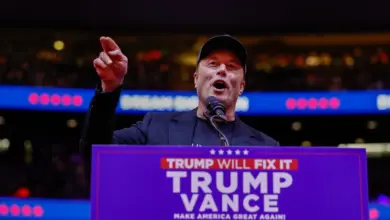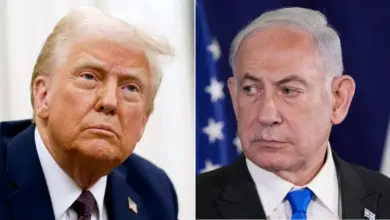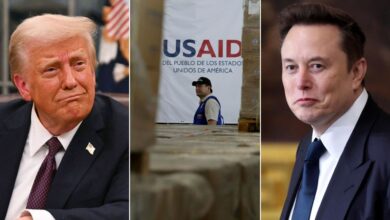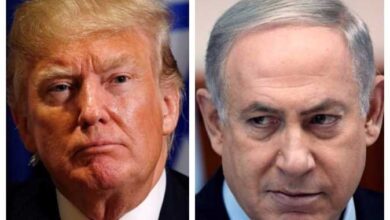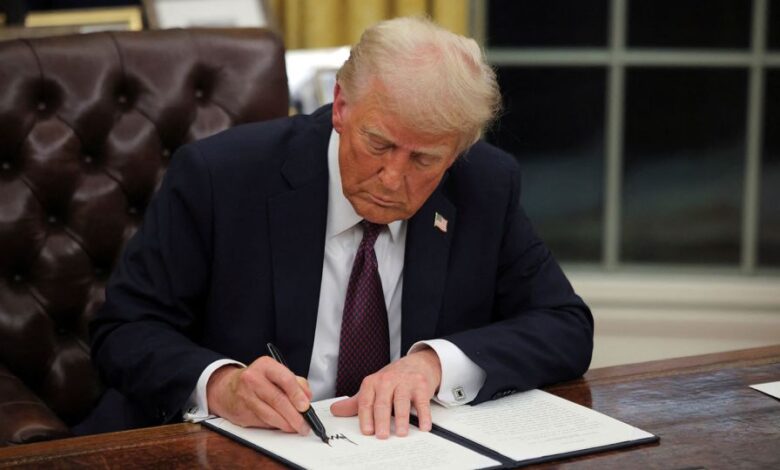
First, nothing is more important than the commander in chief looking tough.
Second, nothing is really what it seems.
Trump’s classic political method is already on full display in his second presidency and helps explain the baffling chaos, brinkmanship and posturing of his tariff showdown with Canada and Mexico.
Punishing 25% levies on imports from America’s closest neighbors were due to come into force at 12:01 a.m. ET Tuesday, but Trump put his two-front trade war on hold, claiming he’d scored two big wins and major concessions.
But despite a White House victory lap, there’s a more convincing case that it was really Trump who backed away from a fight that could have caused severe economic pain.
Trump does have some bragging rights. He campaigned on strengthening America’s northern and southern borders and demanded Canada and Mexico do more to cut the flow of undocumented migrants and fentanyl.
After Trump spoke to President Claudia Sheinbaum on Monday, she announced she’d send 10,000 Mexican troops to the border. Canadian Prime Minister Justin Trudeau agreed to name a fentanyl czar, set up a joint US-Canada border task force and spend $1.3 billion on helicopters and technology to secure the 49th Parallel.
“As President, it is my responsibility to ensure the safety of ALL Americans, and I am doing just that,” Trump wrote on Truth Social after putting tariffs on hold for 30 days to see how the “deals” he forged with Canada and Mexico play out.
Pro-Trump media proclaimed famous victories. “Mexico and Canada buckle,” Fox News declared in a chyron. “Canada Caves,” said Breitbart News, adding, “Art of the Deal: Trump already won the trade war with Mexico for USA.”
For the White House, Trump had racked up wins, and in “America First” mode, bullied foreign states into submission.
“Canada is bending the knee, just like Mexico,” White House press secretary Karoline Leavitt told CNN. This was a stunning insult coming from a press aide with no diplomatic responsibility. It also suggested deep contempt for Canada, especially in the White House of a president who demands it become the 51st state.
How much is real about Trump’s ‘wins’?
But what did Trump get? What did it cost? And will it last?
A more objective view of the bizarre showdown with America’s neighbors suggests a blunter truth: Trump blinked.
The president vowed as recently as last week that there was nothing that Canada or Mexico could do to avoid the tariffs he planned to impose.
But he pulled back on imposing them anyway.
As markets tanked on Monday morning, the potential consequences of a North American trade war were laid bare. The potential for tariffs to spike the grocery prices that Trump was partly elected to fix came into focus. There were fresh warnings that the auto industry — a cross-border concern — could seize up and that the price of a new vehicle could soon shoot up by $3,000.
And Canada and Mexico didn’t really give up that much.
For the Canadians, the cost of a new border strategy was far lower than the fallout of a trade war — and they’d offered the $1.3 billion border strengthening program back in December. Adding a new “fentanyl” czar was hardly a huge political loss.
Mexico has several times moved troops to the border. For example, it sent 10,000 in April 2021 at the request of President Joe Biden, who didn’t need to threaten to pitch America’s southern neighbor into a recession to get it to act.
Still, Trump has renewed his reputation as a brazen and belligerent force, who sees little distinction between allies and adversaries and leaves his interlocutors guessing at his next move.
This is a good political look back home among some of Trump’s supporters. But he’s also reinforced the impression, left over from his first term, that he’s merely transactional and cares more about the chance to claim big wins than the substance of his deals.
More seriously, the tariff showdown has confirmed that once again, the foreign policy of the world’s most powerful nation is an expression of Trump’s volatile character.
And by undermining the US-Mexico-Canada trade deal that he argued in his first term was one of the world’s greatest, Trump has undermined trust in America’s word and raised doubts over his capacity to close future deals. Constantly offending the country’s closest friends threatens to undermine Western solidarity against America’s real enemies like Russian and China.
And by backing down at the 11th hour, the president also sent a clear message to Beijing — which has been slapped with a new 10% tariff on exports to the US — that he might jump at a potential deal if it looks like a breakthrough, even if it lacks depth.
Minutes after those tariffs came in, China retaliated with its own new set of duties which will come into effect on February 10.
Trump has also started to answer one of the key questions about his second term: Is he serious about paying a political price for the disruptive policies he promised would create a new American “golden age?”
On one hand, the president’s vow to rebuild America’s manufacturing base, return jobs from low-wage economies overseas and reverse globalization feels like a genuine attempt to help Americans left bereft by the modern economy. And he’s shown more meaningful policy responses to address the terrible toll left by fentanyl and opioid addiction than most other US leaders.
But such an economic transformation achieved with tariffs would come with considerable pain in the short-term. And his climbdown on Monday suggests he’s not really serious.
Canada is ‘offended’
Trump claims that Canada was failing to crack down on undocumented migration and fentanyl crossing the border.
But federal statistics show that of the 21,889 pounds of fentanyl seized by US border authorities in the 2024 fiscal year, only 43 pounds were taken at the Canadian border. And of the approximately 1.6 million US Border Patrol encounters with migrants at places other than legal ports of entry, just 23,721, or about 1.5%, were at the northern border.
These inconvenient statistics might explain the scattershot nature of the president’s rhetoric on Canada: He’s also argued that the tariffs are justified because America’s northern neighbor has fallen far short of its NATO obligations to spend 2.0% of GDP on defense. (He’s right – official alliance data shows it spent 1.37% on defense in 2024).
The president also complained that US banks were not able to operate in Canada and that the US didn’t need any of its northern neighbor’s lumber, oil or products – giving the impression he wants a fight on any grounds.
Former US Treasury Secretary Larry Summers told “CNN News Central” that White House claims that Canada was inciting the trade war with the US were “absurd.”
“Canada is our friend, Canada is not an important source of illegal immigrants, Canada is not an important source of illegal drugs,” said Summers, who served former Democratic President Bill Clinton. “Canada is an important market for American products, Canada is a crucial co-producer with American automobile companies that enable North America to compete with Asia and Europe,” he said.
The vehemence of Trump’s incessant demands for the annexing of Canada caused alarm north of the border. At first the comments appeared ridiculous, but Trump’s consistent harassment of one of America’s closest friends is beginning to look like part of a 19th century-style imperialist strategy given his designs on Greenland and the Panama Canal.
“Look, I’d like to see Canada become our 51st state,” Trump said Monday. “We don’t need them for the cars. We don’t need them for lumber. We don’t need them for anything.” The president added: “As a state, it’s different. As a state, it’s much different, and there are no tariffs.”
Even if the trade war remains suspended in 30 days, the fallout may take years to overcome.
Trump has succeeded in bringing Canadians together at a time of deep political polarization as Trudeau serves out his final months and a general election looms.
Mark Carney, the former governor of the banks of Canada and England and a candidate for the Liberal Party leadership and therefore prime minister, said on “Quest Means Business” on CNN International that Canada was “offended” given its long friendship with the US. “We are a proud, independent nation. We view ourselves as the greatest country on Earth. We have been insulted on multiple occasions by senior members of the administration. We are not going to reciprocate in those insults.”
Some Americans in border states with deep ties to Canada are also dismayed.
“The long-term damage to our relations with Canada has really, really been severe. The feelings of Canadians, our best friend, our best partner, our best allies have been really devastated,” former Michigan Gov. James Blanchard, a Democrat, told CNN’s Phil Mattingly on Monday. “It’s going to take a lot of time, many months, maybe years, to repair the damage to our partnership with our trusted ally, Canada.”
In a sign of that fury, fans at several NHL and NBA games in Canada have booed the US National Anthem. It’s more normal for Canadian crowds to fill in for anthem singers with microphone issues and belt out the Star-Spangled Banner in a show of affection for their southern neighbors.
Thanks to Trump, the allies are singing a different tune now.

